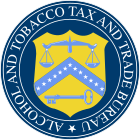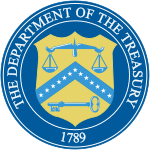
The United States Department of Justice (DOJ), also known as the Justice Department, is a federal executive department of the United States government tasked with the enforcement of federal law and administration of justice in the United States. It is equivalent to the justice or interior ministries of other countries. The department is headed by the U.S. attorney general, who reports directly to the president of the United States and is a member of the president's Cabinet. The current attorney general is Merrick Garland, who has served since March 2021.

The Department of the Treasury (USDT) is the national treasury and finance department of the federal government of the United States, where it serves as an executive department. The department oversees the Bureau of Engraving and Printing and the U.S. Mint. These two agencies are responsible for printing all paper currency and minting coins, while the treasury executes currency circulation in the domestic fiscal system. The USDT collects all federal taxes through the Internal Revenue Service; manages U.S. government debt instruments; licenses and supervises banks and thrift institutions; and advises the legislative and executive branches on matters of fiscal policy. The department is administered by the secretary of the treasury, who is a member of the Cabinet. The treasurer of the United States has limited statutory duties, but advises the Secretary on various matters such as coinage and currency production. Signatures of both officials appear on all Federal Reserve notes.

The National Firearms Act (NFA), 73rd Congress, Sess. 2, ch. 757, 48 Stat. 1236 was enacted on June 26, 1934, and currently codified and amended as I.R.C. ch. 53. The law is an Act of Congress in the United States that, in general, imposes an excise tax on the manufacture and transfer of certain firearms and mandates the registration of those firearms. The NFA is also referred to as Title II of the federal firearms laws, with the Gun Control Act of 1968 ("GCA") as Title I.

The Bureau of Alcohol, Tobacco, Firearms and Explosives (BATFE), commonly referred to as the ATF, is a domestic law enforcement agency within the United States Department of Justice. Its responsibilities include the investigation and prevention of federal offenses involving the unlawful use, manufacture, and possession of firearms and explosives; acts of arson and bombings; and illegal trafficking and tax evasion of alcohol and tobacco products. The ATF also regulates via licensing the sale, possession, and transportation of firearms, ammunition, and explosives in interstate commerce. Many of the ATF's activities are carried out in conjunction with task forces made up of state and local law enforcement officers, such as Project Safe Neighborhoods. The ATF operates a unique fire research laboratory in Beltsville, Maryland, where full-scale mock-ups of criminal arson can be reconstructed. The ATF had 5,285 employees and an annual budget of almost $1.5 billion in 2021. The ATF has received criticism over its handling of the Ruby Ridge siege, the Waco siege and other incidents.

An American Viticultural Area (AVA) is a designated wine grape-growing region in the United States, providing an official appellation for the mutual benefit of wineries and consumers. Winemakers frequently want their consumers to know about the geographic pedigree of their wines, as wines from a particular area can possess distinctive characteristics. Consumers often seek out wines from specific AVAs, and certain wines of particular pedigrees can claim premium prices and loyal customers. If a wine is labeled with an AVA, at least 85% of the grapes that make up the wine must have been grown in the AVA, and the wine must be fully finished within the state where the AVA is located.
Excise tax in the United States is an indirect tax on listed items. Excise taxes can be and are made by federal, state and local governments and are not uniform throughout the United States. Certain goods, such as gasoline, diesel fuel, alcohol, and tobacco products, are taxed by multiple governments simultaneously. Some excise taxes are collected from the producer or retailer and not paid directly by the consumer, and as such often remain "hidden" in the price of a product or service, rather than being listed separately.

In the United States, a gun show is an event where promoters generally rent large public venues and then rent tables for display areas for dealers of guns and related items, and charge admission for buyers. The majority of guns for sale at gun shows are modern sporting firearms. Approximately 5,000 gun shows occur annually in the United States.
The Bureau of Prohibition was the United States federal law enforcement agency formed to enforce the National Prohibition Act of 1919, commonly known as the Volstead Act, which enforced the 18th Amendment to the United States Constitution regarding the prohibition of the manufacture, sale, and transportation of alcoholic beverages. When it was first established in 1920, it was a unit of the Bureau of Internal Revenue. On April 1, 1927, it became an independent entity within the Department of the Treasury, changing its name from the Prohibition Unit to the Bureau of Prohibition. In 1930, it became part of the Department of Justice. By 1933, with the repeal of Prohibition imminent, it was briefly absorbed into the FBI, or "Bureau of Investigation" as it was then called, and became the Bureau's "Alcohol Beverage Unit," though, for practical purposes it continued to operate as a separate agency. Very shortly after that, once repeal became a reality, and the only federal laws regarding alcoholic beverages being their taxation, it was switched back to Treasury, where it was renamed the Alcohol Tax Unit.
A Federal Firearms License (FFL) is a license in the United States that enables an individual or a company to engage in a business pertaining to the manufacture or importation of firearms and ammunition, or the interstate and intrastate sale of firearms. Holding an FFL to engage in certain such activities has been a legal requirement within the United States since the enactment of the Gun Control Act of 1968. The FFL is issued by the Bureau of Alcohol, Tobacco, Firearms, and Explosives

Bottled in bond (BIB) is a label for an American-produced distilled beverage that has been aged and bottled according to a set of legal regulations contained in the United States government's Standards of Identity for Distilled Spirits, as originally specified in the Bottled-in-Bond Act of 1897. As a reaction to widespread adulteration of American whiskey, the act made the federal government the guarantor of a spirit's authenticity, gave producers a tax incentive for participating and helped ensure proper accounting and the collection of tax that was due. Although the regulations apply to all spirits, most bonded spirits are whiskeys in practice.
The Federal Alcohol Administration was a United States government agency created in 1935 by the Federal Alcohol Administration Act, title 27 chapter 8 of the United States Code. It was created to regulate the alcohol industry after the repeal of Prohibition, replacing a previous body which did not have statutory powers. The Act still partly continues in force, underpinning the powers of the Alcohol and Tobacco Tax and Trade Bureau (TTB).

The Under Secretary for Terrorism and Financial Intelligence is a position within the United States Department of the Treasury responsible for directing the Treasury's efforts to cut the lines of financial support for terrorists, fight financial crime, enforce economic sanctions against rogue nations, and combat the financial support of the proliferation of weapons of mass destruction. The Under Secretary is appointed by the President and confirmed by the Senate.

American whiskey is whiskey produced in the United States. American whiskeys made from mashes with at least 51% of their named grains include bourbon whiskey, rye whiskey, rye malt whiskey, malt whiskey, wheat whiskey, Tennessee whiskey, and corn whiskey.

The North Coast AVA is an American Viticultural Area in the state of California that encompasses grape-growing regions in six counties located north of San Francisco: Lake, Marin, Mendocino, Napa, Sonoma, and Solano. This large appellation covers over 3,000,000 acres (5,000 sq mi) and includes a number of smaller sub-appellations that all share the common ecology trait of weather affected by the fog and breezes off the Pacific Ocean.
Rex Darwin Davis was an American law enforcement official who served as the first director of the Bureau of Alcohol, Tobacco, and Firearms, which later became known as the Bureau of Alcohol, Tobacco, Firearms and Explosives.
Bradley A. Buckles was sworn in as the fifth Director of the Bureau of Alcohol, Tobacco and Firearms (ATF) on December 20, 1999, by Secretary of the Treasury Lawrence Summers. He previously served as deputy director under ATF Director John Magaw from 1996 to 1999. He began his service with ATF in 1974 when he joined the ATF Office of Chief Counsel. He was named Chief Counsel of ATF in 1995.
Special Occupational Taxpayers are a group of Federal Firearm Licensees in the United States who manufacture, import and/or transfer NFA weapons. The National Firearms Act Special Occupational Taxpayer class is part of the Internal Revenue Code of 1986.

The Ending Federal Marijuana Prohibition Act is a series of federal marijuana decriminalization bills that have been introduced multiple times in the United States Congress.

The Federal Firearms Act of 1938 (FFA) imposed a federal license requirement on gun manufacturers, importers, and persons in the business of selling firearms. The term federal firearms licensee (FFL) is used to refer to those on whom the license requirement is imposed. "FFL" is also used to refer to the license itself.











